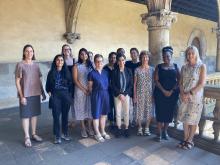Gender Just Transitions: Cultivating Equality For A Sustainable Economy
Coordinators: Cathi Albertyn (Professor of Law and SA Research Chair in Equality, Law and Social Justice, School of Law, University of the Witwatersrand, Johannesburg, South Africa), Meghan Campbell (Deputy-Director of the Oxford Human Rights Hub; Reader in International Human Rights, Law, Associate Dean, Birmingham Law School, University of Birmingham, United Kingdom ), Sandra Fredman (Reader in International Human Rights, University of Birmingham), Judy Fudge (Professor, School of Labour Studies, McMaster University), Kamala Sankaran (Professor of Law and Ford Foundation Chair in Public Interest Law, National Law School of India University Bengaluru, India)
Description of the meeting
Intersectional gendered inequalities in the labour market and economy are pervasive and systemic, linked, inter alia, to the global division of labour, social reproduction, child and elder care, household and intra-household inequalities, labour market inequalities, welfare regimes, the feminization of poverty, and economic policies such as neoliberalism. Recently, the Covid-19 pandemic, climate crisis, the fourth industrial revolution and advances in artificial intelligence have added new pressure points and countervailing tendencies in the struggle for economic equality for women.
New conversations about more just, redistributive and/or sustainable economies in global, national and local contexts often use the language of ‘transition’, as a movement away from a problematic past to a different, more hopeful, future whether in the context of climate crisis, the Covid-19 pandemic or, generally, towards a more just future.
Whether and how these transitions take place, the place of women within them, and the degree of economic equality that is possible, are matters of considerable debate and ideological difference. How this plays out matters. Unless women and all disadvantaged groups are centred in processes of transition, we risk moving from old, unjust economies to new, but still unjust, ones. In this project, we are interested in developing the idea of a ‘gender just transition’ to (i) interrogate the old and new barriers to more gender just labour markets and economies across different areas of law, policy, and practice, and (ii) to identify whether and how norms, policies and laws relating to gender equality and women’s rights might aid transitions to greater economic equality and justice. We aim to do so across different scales (global, national, local), areas of law and policy (labour, social welfare, equality, development and human rights) and geographic areas.
This workshop brings together papers that interrogate these questions from a number of perspectives: conceptual and theoretical, international and national policy frameworks, labour market policy and labour law, climate crisis, social policy and the welfare state, positive measures and discrimination law. Participants have been recruited from the Global South and the Global North with the goal of challenging dominant development narratives. Our aim in the workshop is to provide critical reflection on each paper and to hone the core themes of our project: gender just transitions, economic equality for all, the place of law in achieving these, and strategies to do so.
Our experience in Oñati
In July 2025, we held our workshop our ‘Gender Just Transitions: Cultivating equality for a sustainable economy’ at the International Institute for Sociology of Law, Oñati.
From the outset, we were impressed by the highly efficient manner in which Malen and her team at the IISL managed the administration of the workshop, from the early publication of the list of participants and draft programme, through to handling registrations and all the logistics of travel from Bilbao, accommodation, meals and the workshop itself. The administration is highly efficient, but always warm and helpful, ready to answer any query or request and address any concerns.
The conference venue in the old university is charming, yet modern and well-equipped. The IISL thinks of everything – from organising a welcome dinner at the Town Square and recommendations for early morning coffee and brioche to the seamless organisation of the workshop itself. Everything is in place: from good coffee, biscuits, fresh fruit and personalised water bottles to online connections and excellent Wi-Fi.
By taking the burden of organising and running the workshop away from its organisers, the IISL allowed us to focus on the intellectual project together with our colleagues. It provided a vibrant space for critical engagement and interdisciplinary exchange. After long and stimulating days of intellectual engagement, we were able to walk in the town and continue our debates over drinks, pintxos and dinner. Onãti is a truly unique venue for a workshop.
Special thanks are due to Malen who was there to meet us on arrival, accompany us to the welcome dinner, oversee our workshop and bid us farewell when we left Onãti. The IISL should be rightly proud of its team and the space they provide for meaningful intellectual and rich scholarly engagement, as well as renewing old friendships and making new ones.
Workshop Coordination Team
Avenida de la Universidad, 8
Apartado 28
20560 Oñati (Gipuzkoa) - Spain
T: +34 943 78... Ver teléfono
E: workshop@iisj.es




